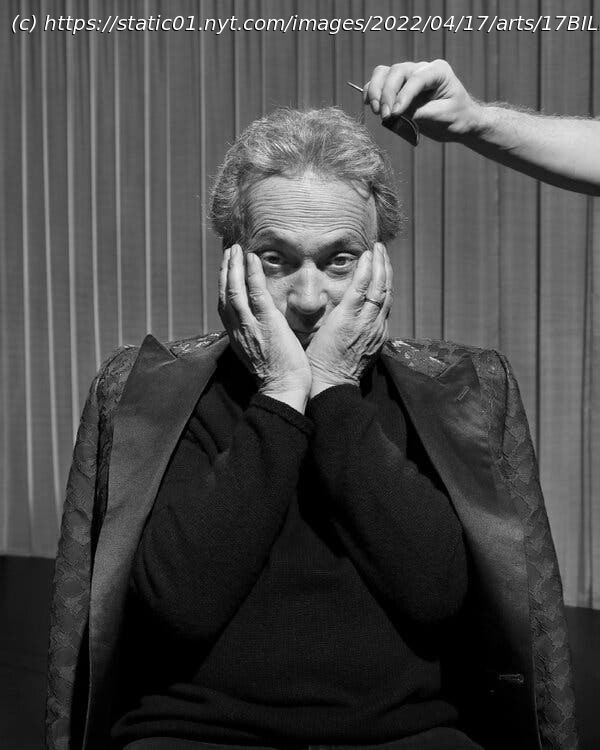The comedian is starring in “Mr. Saturday Night,” a musical version of his 1992 movie about an aging performer who won’t accept that his time in the spotlight is up.
A funny thing happened in the rehearsal room of “Mr. Saturday Night” a few weeks ago. Billy Crystal was performing a scene from this new Broadway musical in which his lead character, an aging, out-of-touch comedian named Buddy Young Jr., has learned that he was mistakenly included in an in memoriam segment on the Emmy Awards. Invited to appear on the “Today” Show to correct the error, Buddy sees an opportunity to reclaim the spotlight he once commanded. With that motivation, Crystal turned to his co-star David Paymer, who plays Buddy’s endlessly loyal brother, Stan, and he began to sing a song about his deep yearning for a crowd’s attention: It’s an essentially comedic song, delivered in the warm, warbling voice we heard Crystal employ each year when he was a ubiquitous comedy star and a reliably genial Academy Awards host. “Mr. Saturday Night,” which opens April 27 at the Nederlander Theater, is a throwback to the era of Crystal’s hegemony in the 1980s and early ’90s, when he straddled the cultural landscape with his standup specials and hit films like “City Slickers” and “When Harry Met Sally…” The film version of “Mr. Saturday Night,” which Crystal starred in and directed in 1992, felt like a strange misstep at the time. Far from the eager rib-ticklers he was known for, Crystal — then 44, under layers of old-age makeup — played Buddy as a selfish curmudgeon who has alienated his family and refuses to accept that his career is over. Now 74, Crystal is not that guy — if he doesn’t enjoy the outsize dominance he once had, he doesn’t share Buddy’s desperation to reclaim it, either. Still, as Crystal told me a few days before the rehearsal, there is a certain pleasure he finds in revisiting this singularly disagreeable character: “To play him 30 years later, they actually have to make me younger,” he joked. But seriously, folks: Crystal explained that when he performs as Buddy in the stage musical, he isn’t weighed down by elaborate prosthetics or an aura of likability, and it brings a newfound ease to his performance. “When he’s cantankerous and edgy with people, it’s in front of a live audience,” he said excitedly. “I feel them get upset with him and I hear them go, ‘Ooh.’” Having lived long enough to match the character in age and to experience the kinds of setbacks and regrets that shaped him, Crystal understands that Buddy is not a bad guy. “He’s misunderstood and confused, bitter and regretful, and time is running out,” he said. This is the point where Billy Crystal and Buddy Young Jr. really intersect: at the realization that there is more life behind them than in front of them, and the anxiety that they might never again be as good as they once were. For himself, and for any comedian who cares about the art, Crystal said, “The worst nightmare is, do you wake up one day and you’re not funny anymore? Do you wake up and you’re not relevant? When does that happen?” He added: “There’s a magic about when it’s good, and when it’s bad, it’s really something incredible. There’s a terrible feeling of, I’m losing them.” Not that Crystal lets this fear keep him up at night — “I’m a bad sleeper, anyway,” he said. “I don’t need to worry about more than I’m worrying about” — but the best solution he has found is to focus on projects that put him to the test, like “Mr. Saturday Night.” “You’ve got to keep pushing ahead and not let anybody leave you behind,” he said. In early March, I met with Crystal at his spacious penthouse apartment in downtown Manhattan. Dressed in a long-sleeved T-shirt, jeans and sneakers, he was a subdued but still quippy host as he showed off some of his artifacts: a desk nameplate for Dr. Benjamin Sobel, his “Analyze This” character; an enlarged photograph of celebrity guests at the 1937 Oscars. (“Even then, the show ran too long,” he said.) Crystal’s love of nostalgia and showbiz history helped inspire the character of Buddy Young Jr.






